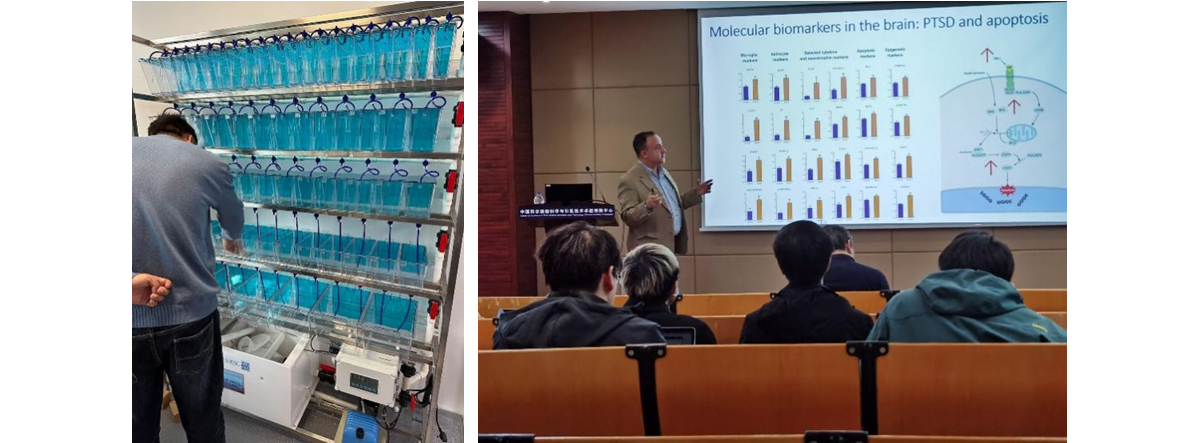18 Apr 2024
 Dr. Chun (Kevin) Chan
Dr. Chun (Kevin) Chan
Assistant Professor
Experience
“Nature never fails to amuse you.”
Dr. Chun (Kevin) Chan received his PhD from City University of Hong Kong in 2017. He worked as a fellow at Shanghai Institute for Advanced Study, Zhejiang University (2021-2024). Meanwhile, he is a postdoctoral researcher at the Institute of Quantitative Biology, College of Life Sciences of Zhejiang University and Center for Precision Medicine of Shenzhen Luohu People’s Hospital. Previously, he completed his postdoctoral training at the College of Pharmacy, Ohio State University, United States (2017-2021). Recently, he joined Xi’an Jiaotong-Liverpool University as an Assistant Professor.
Since his PhD, Dr. Chan has pursued an interdisciplinary research program on the interface of molecular simulation, drug discovery and machine learning. His current research interests are in artificial intelligence for biomolecular dynamics (AI4Science), molecular simulation of various complex biomolecular systems including the human immunological synapse, the bacterial membrane protein assembly, the CRISPR genome editing tools, and design of molecular glues for protein machinery. Dr. Chan has published 20+ high-quality papers in peer-reviewed journal, including Nature, Nature Communications, PNAS, JCIM, JPCB etc. He also actively serves in the academic community as a member of Biophysical Society, American Chemical Society, The Protein Society.
Teaching/Research field and wishes
In his teaching curriculum, Dr. Chan will focus on machine learning methods for computational biology and molecular simulations of complex biomolecular systems.
Dr. Chan has been at the forefront of advancing methods for describing the behavior of proteins and other macromolecules, and is an advocate of open research and software for the benefit of society.
His long-term research interest is in the development of computational methods to promote our ability to simulate and understand biological systems, in particular addressing fundamental challenges such as allostery in protein dynamics and drug development. He wishes to pioneer biomedical technologies from a biophysical standpoint, aiming to make meaningful impacts on human health.
 Through computational microscopes, we reveal biomolecular mechanisms at spatial and temporal scales that are difficult to observe experimentally
Through computational microscopes, we reveal biomolecular mechanisms at spatial and temporal scales that are difficult to observe experimentally
“Xi'an Jiaotong-Liverpool University (XJTLU) is a renowned international university in Jiangsu, celebrated for its diverse and inclusive community. At this university, colleagues from diverse cultural backgrounds engage openly with each other, creating a dynamic workplace. Having joined the Department of Biological Sciences, I see this as my chance to make meaningful contributions to both teaching and research in this rapidly growing institution.”
 Professor Alan Kaluev
Professor Alan Kaluev
Experience
Professor Alan Kaluev is an expert in neuroscience with over 400 publications in the field, and a Full Professor in the Department of Biological Sciences, School of Science at Xi'an Jiaotong-Liverpool University (XJTLU). A graduate from Moscow State University, he holds PhD degree in Physiology from RUDN University in Russia, PhD in Anatomy from Tampere University (Finland), and Doctor of Science degree in Physiology from St. Petersburg State University. His 30-year academic research career is reflected in over 25 000 citations and a current H-index of 80 (Google Scholar). He is also a Member (Academician) of the European Academy, and holds the rank of Professor of the Russian Academy of Sciences (RAS). He was named Number 1 “most cited” neuroscientist in Russia (Research.com, 2022-2023) and was also recognized recently among top 2% global scientists by the US Stanford University 2023 Academic Ranking. Professor Kaluev’s main research directions in the School of Science at XJTLU mainly include the following two themes: 1) Developing zebrafish brain disease models and incorporating artificial intelligence for rapid drug screening; and 2) Analyzing molecular and genetic correlates of central nervous system diseases using animal models.
At the same time, Professor Kaluev also has rich experience of faculty and research appointments in top universities overseas, such as USA, Russia, Finland and UK (including University of Bristol, University of Birmingham, NIH, Georgetown University, Tulane University), as well as Professorships and Lead Scientist positions in St. Petersburg State University and Ural Federal University in Russia. He has been invited to give lectures and talks, as well as to chair sessions, at numerous international Universities, research Institutes, and multiple international and national scholarly congresses, conferences and symposia. He has established and continues to maintain and develop multiple collaborations with colleagues in China, Russia, UK and other countries worldwide. As a research leader, organizer and administrator, Professor Kaluev has successfully led multiple large-scale research projects and large research teams, and successfully educated multiple young scientists, and many of them have become accomplished young ‘rising stars’ in science and medicine in USA, Russia and Japan.
Teaching / Research field
Professor Kaluev presently teach courses in cell biology and bioengineering for undergraduates and master students at the School of Science. In the future, he also plans to develop courses in neuroscience and pharmacology at XJTLU.
“I am a neuroscientist and pharmacologist. Therefore, the laboratory that I direct here in the School of Science at XJTLU focuses on translational neuroscience. We create animal models of highly prevalent human brain disorders, especially those related to stress, such as depression and anxiety. We think it is important to be able to apply the results of fundamental research in practical medicine - diagnosis and therapy of brain diseases. In our experiments we use small aquatic organisms, zebrafish. In recent years, these fish have become a popular object of research in biomedicine. In the future, we will use rodents and, eventually, clinical models as well.”

When it comes to exploring how the results of fish research can be applied to humans, Professor Kaluev and his team found that the applicability is very broad.
“In fact, there is no important brain disease that affects humans that cannot be modeled in fish. This applies to epilepsy, stress, addiction, depression… You can treat fish with a drug that causes convulsions, and get the same picture that we see in people during an epileptic attack. And antiepileptic drugs have the same effect on people and fish. Another good example - autism - can also be evoked in fish. They don't speak, but they are very social animals that spend much time together (swimming in shoals) than humans.”
Another critical direction of professor Alan Kaluev's research is the use of zebrafish which are gradually becoming established as one of the stages of small molecule testing in laboratories around the world. The widespread introduction of this model organism into research and preclinical practice as an additional (auxiliary) test in addition to studies on rodents will significantly speed up and reduce the cost of the development of new drugs, as well as more fully and adequately assess the biological risks of exposure to chemicals.
18 Apr 2024








